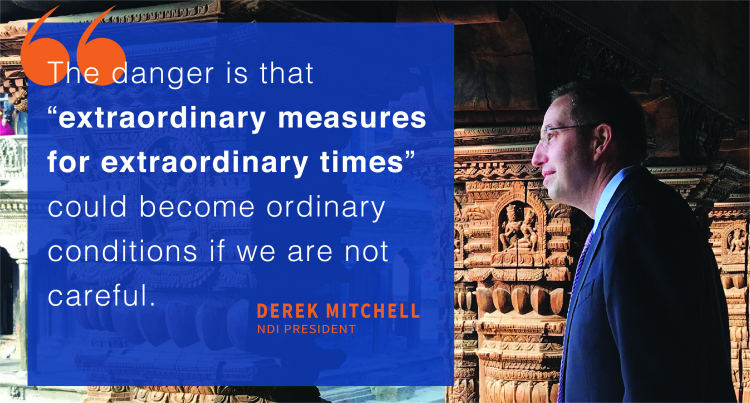Governance and International Security: Why COVID-19 Should Serve as a Wake-up Call
Dear Friends and Partners,
Times of crisis are dangerous moments in the political life of a country. Citizens understandably look to their government for protection and reassurance and are often willing to grant authorities extraordinary powers to that end. The COVID-19 pandemic has been no different. On every continent, authoritarian opportunism has been on full display, as ambitious leaders seek to take advantage of the crisis to grab more power and sideline democratic institutions.
Authoritarians will argue their governance model is uniquely suited to deliver the health and security citizens crave. They, of course, are wrong. While both democratic and authoritarian governments can respond effectively – or not – to a crisis, the COVID-19 crisis is Exhibit A that political systems do matter.
Authoritarian systems by their very nature make such health crises – including pandemics – more likely.
When a government does not trust its people;
When it is not confident in its political legitimacy;
When it suppresses free flow of information;
When it does not allow, empower or capacitate independent institutions to check and validate its activity, or enable citizens to independently organize to provide urgent services;
When its data cannot be trusted;
When its officials, health professionals, or others are afraid or prevented from speaking truth to power, and afraid to act decisively absent strict orders from senior political leadership;... the ground is set for disaster.
It is not a coincidence the pandemic started in China. There are practical implications inherent in open versus closed systems – implications that turned a local health crisis into a deadly pandemic.
The irony is that just as the world needs more open, democratic societies to prevent future health crises, opportunistic politicians on every continent are wasting no time to close political and civic space in their countries. The danger is that “extraordinary measures for extraordinary times” could become ordinary conditions if we are not careful.
Democracies must wake up to the threat. They must speak out, and when needed, sanction political opportunists, even when political allies; strongly affirm that degradation of democratic rights and political freedoms is not required even during the current crisis; model that activity in their own societies; and support activists in countries around the world as they struggle to safeguard their political rights in an era of social distancing.
NDI continues to do its part. In each of the over 70 countries in which we currently work, our teams are finding ways to adapt to ensure our programming continues, and that our partners receive the support they need to protect their political rights and develop democratic practice in their countries.
That includes:
- helping town hall meetings go virtual in Armenia;
- assisting partners to move youth engagement work online in Jordan;
- developing new digital outreach for Libya’s public health initiative;
- monitoring elections in Mali to maintain electoral integrity and public health while voting;
- conducting weekly public opinion surveys on the government’s COVID-19 response in Ukraine;
- drawing on lessons from the 2014 Ebola outbreak to highlight the crucial role of civil society in the fight against COVID-19; and
- completing a documentary about what democracies can learn in the COVID-19 era from Taiwan’s fight against Chinese disinformation.
The COVID-19 pandemic is a health crisis in every sense of the word – in political and social terms, just as much as in physical, emotional and economic terms. Some are calling the current moment an inflection point for democracy.
If so, democracies must use this critical moment to bend the curve its way. Highly resourced and motivated authoritarian powers are exploiting the current climate of fear and insecurity to shape a world in their image and interest. They are playing a weak hand, but right now they have the advantage of initiative. We must take that initiative back, and unite voices on every continent on the urgent need to protect open societies as essential to human security, prosperity and dignity.
NDI will have more to say in the coming weeks on the implication of the times we live in, and how NDI is adapting to address new challenges to democratic practice globally.
As always, we thank you for your support, and hope you and yours remain healthy and safe.
Sincerely,
Derek Mitchell, President
